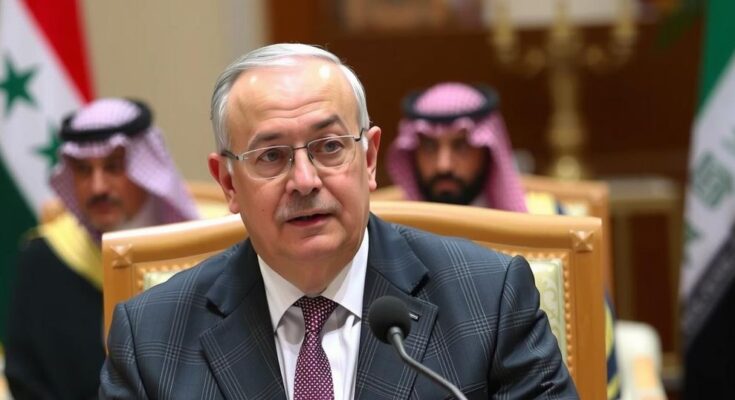Syria’s Foreign Minister, Asaad Al Shibani, will visit the UAE, Qatar, and Jordan, seeking investment and improved relations to aid the country’s reconstruction post-conflict. His recent trip to Saudi Arabia also revealed a commitment to stability and partnerships amidst discussions of lifting international sanctions imposed on Syria. This political realignment represents growing regional support and emerging opportunities for cooperation in Syria’s recovery efforts.
Asaad Al Shibani, the Foreign Minister of Syria, announced his imminent official visits to the United Arab Emirates, Qatar, and Jordan this week, following his recent trip to Saudi Arabia. The new Syrian administration is actively pursuing international investment and striving to improve relations with neighboring nations amid efforts to revitalize a war-torn economy and infrastructure. Mr. Al Shibani expressed optimism about these visits, emphasizing a commitment to fostering stability, security, and economic partnerships in those countries.
Details regarding the agenda of this diplomatic endeavor remain undisclosed, and there has been no commentary from the visited Arab states. Contacts with the Syrian government have been established by various regional entities, particularly since the administration was assumed by Ahmad Al Shara, the leader of Hayat Tahrir Al Sham—a group formerly linked to Al Qaeda. Recent visits by high-ranking officials from Kuwait and the Gulf Cooperation Council to Damascus signify growing foreign support for Syria’s political landscape.
During a preceding visit to Riyadh, Mr. Al Shibani engaged with Saudi officials, where Prince Faisal reiterated the Kingdom’s support for security and stability in Syria. Discussions highlighted the potential for significant investment opportunities that could arise from Syria’s recovery, with neighboring states encouraged to participate in these endeavors. Furthermore, during an extraordinary meeting of Gulf foreign ministers, there were calls to lift existing international sanctions imposed on Syria, which have hindered the nation’s recovery efforts.
The political situation also reflects on Lebanon, where caretaker Prime Minister Najib Mikati has been in dialogue with Mr. Al Shara. Mr. Mikati disclosed his receipt of an invitation to visit Syria, signifying an intent to strengthen bilateral relations. However, tensions continue, as recent clashes between the Lebanese army and armed Syrians at the border highlight unresolved issues.
The regional dynamics are shifting as countries seek to establish stronger ties with Syria, looking to the future construction of a stable economic landscape.
The backdrop of this diplomatic activity centers around Syria’s prolonged civil conflict that has devastated its economy and infrastructure over the past decade. Following the ousting of Bashar Al Assad, the new Syrian regime, led by Ahmad Al Shara, aims to reposition the country on the regional diplomatic stage, seeking investments and collaboration with its neighbors. The shifts in governance have prompted a reassessment of relationships and have evoked interest from neighboring states to exert influence in Syria’s rebuilding process. Furthermore, international sanctions remain a significant challenge, fueling discussions among Gulf states regarding their potential lifting, as Iraq and Lebanon also navigate their relationships with Syria amidst complex border issues.
In conclusion, Syria’s Foreign Minister Asaad Al Shibani’s upcoming visits to the UAE, Qatar, and Jordan reflect the country’s aspiration for renewed diplomatic relations and economic support following years of conflict. The discussions surrounding potential investments, security cooperation, and the lifting of sanctions indicate a pragmatic shift in the regional political landscape, with broader implications for Lebanon’s stability as well. Such engagements signal a desire among neighboring nations to contribute to Syria’s recovery and assert their roles in shaping its future.
Original Source: www.thenationalnews.com




